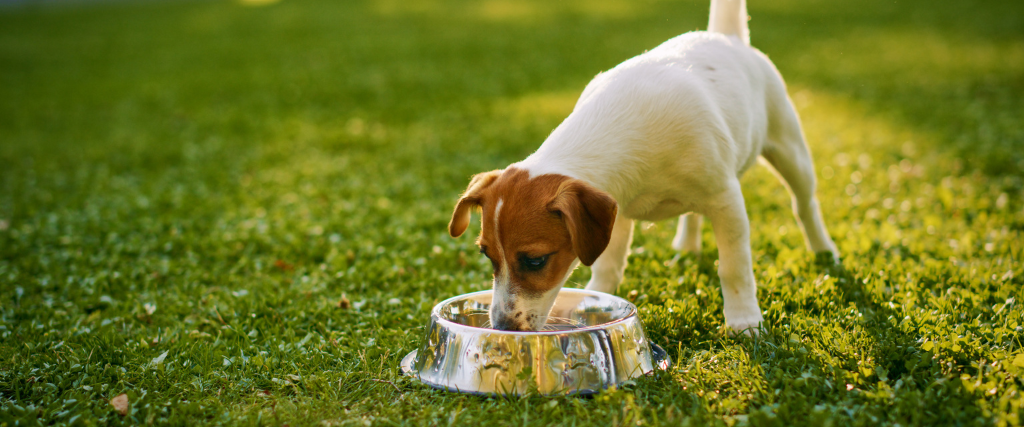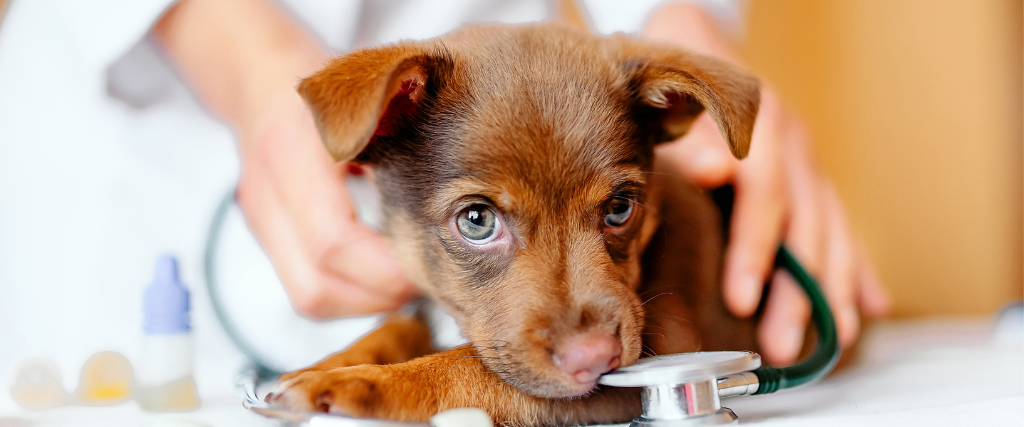How much food should I feed my puppy?
"About 1/3 less than whatever the bag recommends; usually about 1 cup per 10 pounds of dog". Don't panic if your dog won't eat as much as the bag says. In fact, if your puppy is leaving kibble in the bowl, that pretty much proves you're feeding too much at each sitting.
Ideally, you should feed your new puppy 2-3 times a day. If they poop every time you feed them, that's a pretty good indicator that three times a day is still necessary. Once your dog gets over 15-20 pounds and has a solid bowel movement every morning, and every evening, you can probably cut back to twice-daily food and water.
How much water should I feed my puppy?
Most dogs drink about 1 cup of water per 10lbs of dog* per day. Split this total into 2-3 feedings with her kibble, then pick up the water in between feedings, so they don't spend all day drinking water just because it's bored.
*obviously, provide access to more water if it's hot outside.
How big is my dog going to get?
Generally, an adult average-sized dog at 12 months of age weighs about twice their weight at 4 months of age or 2.5x the weight at 14 weeks.
Adult giant breeds grow more slowly, take longer to mature, and don't reach adult growth until they're at least 16-18 months old. These dogs will weigh about twice as much as they did when they were 5 months old.
Adult small or toy breeds reach their adult weight somewhere between 9 and 10 months of age and will weigh about four times what they weigh at 6 weeks of age.

I have a "large breed" puppy (predicted adult weight is over 40-50 pounds). Do I need to feed a "large breed" puppy food?
Yes. Large breed food contains fewer calories per kibble, which helps your puppy grow up more slowly, giving joints more time to develop and hopefully preventing joint issues caused by too rapid growth.
When does my puppy need more shots? (aka "But doc, my breeder said...")
I get it. You loved your breeder. You trusted your breeder. She did her job, which was to stand around and watch a couple of frisky dogs get busy. That's fantastic. She even kept your new furry bundle of joy alive long enough to get to see their veterinarian, which is great.
However, your breeder is not a veterinarian. You're in my house now, and I'm responsible for keeping your dog alive and healthy from now on.
It's heartbreaking to see a dog die of an infectious disease I could have easily prevented just because the breeder didn't understand how to store vaccinations properly. Heartbreaking and senseless.
Please ignore medical advice from every other person in the whole world except your veterinarian from now on, carefree and secure in the knowledge that you have an actual medical professional with an actual degree in medicine on your side.
Puppy vaccines start at around 6 weeks of age, get boostered every 2-3 weeks, and end at around 16 weeks of age.
The first vaccine in a pet's series must be given when your puppy or kitten is between 6-8 weeks of age. If you wait much longer than that, your puppy may die of a preventable disease.
The series then must continue every 2-4 weeks (at your veterinarian's discretion) until they are between 12 and 16 weeks old. (exact schedule depends on the vaccine manufacturer, local laws, and veterinarian's recommendation based on your lifestyle). If you wait longer than 4-5 weeks between boosters, your puppy may, once again, die of a preventable disease, so don't wait, follow your vet's schedule exactly as prescribed!

Rabies vaccine is REQUIRED BY LAW in every dog and cat over 3 months old (NOT 6 months old!)
All states have laws, and an example from the Board of Animal Health, Indiana Rabies Laws and Regulations states:
"All dogs, cats, and ferrets three (3) months of age and older must be vaccinated against rabies."
Prior to the mid-1980's, Rabies vaccines used to contain modified live viruses. Now they don't.
Therefore, any breeder suggesting you wait until 6 months of age to give rabies vaccine is making that recommendation based on an unfounded fear related to modified live vaccines that nobody has used for over 30 years. That's some seriously bad, outdated advice.
Never assume a breeder knows the rules and regulations (let alone the medical requirements) of vaccination, always ask a veterinarian.
The Three Basic kinds of Parasites (aka "Intestinal Worms are not Heartworms!")
ONE: On the outside of the dog, like fleas and ticks.
TWO: In the gut, like roundworms, hookworms, whipworms, tapeworms, Giardia and coccicia. All of these can be detected through routine screenings of poop samples 2-3 times during your puppy's vaccine series, and each one may require a different dewormer to treat.
THREE: In the blood, which is where heartworms live - transmitted between animals by mosquitoes. Every puppy and kitten needs routine monthly heartworm prevention every month forever.
